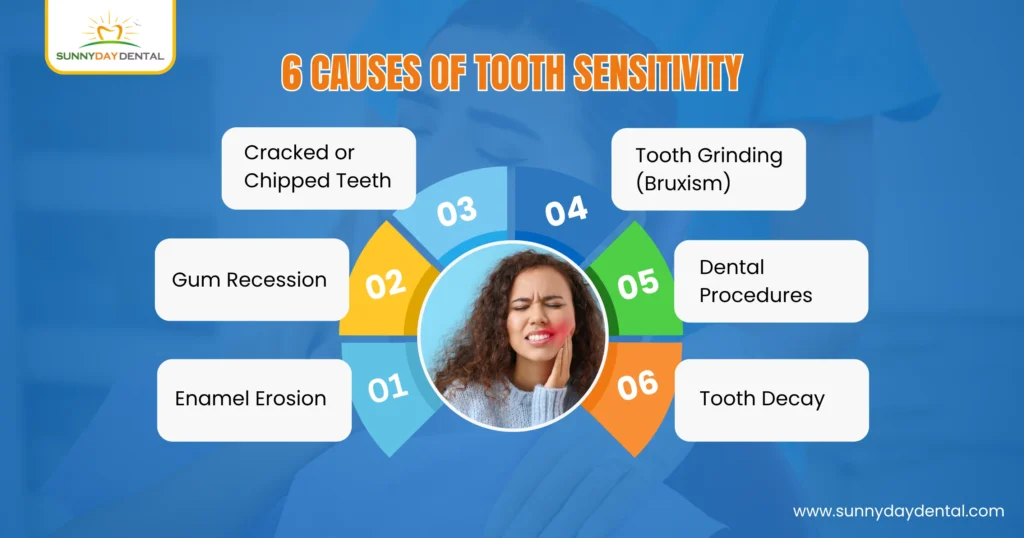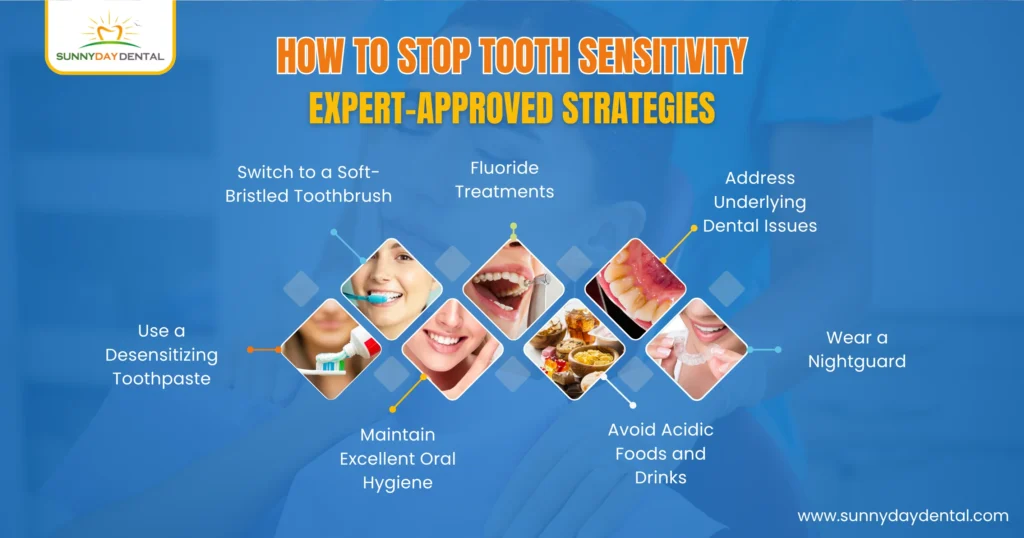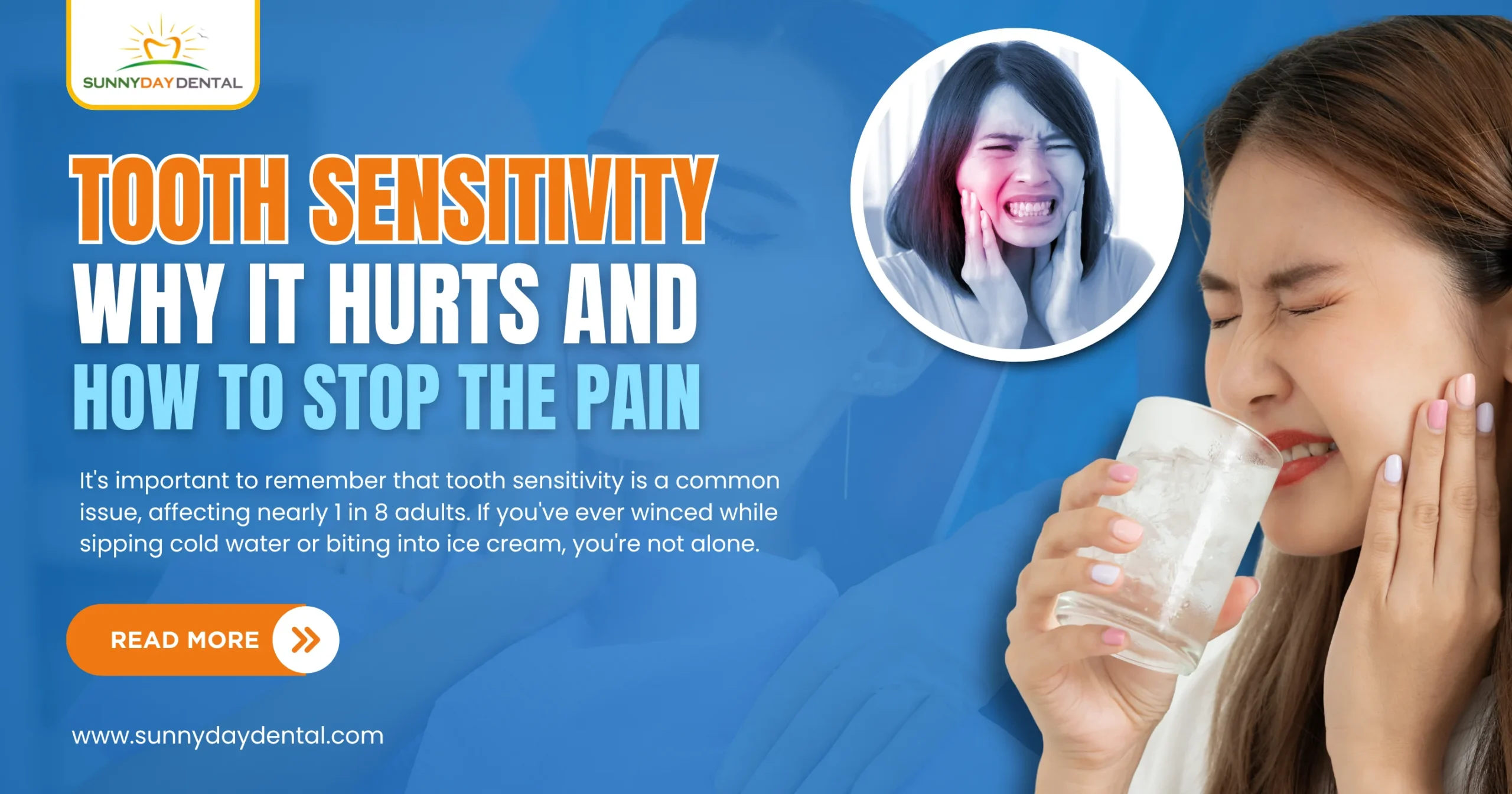It’s important to remember that tooth sensitivity is a common issue, affecting nearly 1 in 8 adults. If you’ve ever winced while sipping cold water or biting into ice cream, you’re not alone. This sharp, sudden pain or discomfort in your teeth when exposed to hot, cold, sweet, or even air often signals an underlying issue that needs attention.
Table of Contents
ToggleTooth enamel, the hardest substance in your body, protects the inner layers of your teeth. When enamel wears down or gums recede, the dentin underneath becomes exposed. This dentin contains microscopic tubules leading to the tooth’s nerve, making your teeth sensitive to external stimuli.
Understanding why it happens is key to finding lasting relief.
6 Causes of Tooth Sensitivity

This dental sensitivity can result from a range of oral issues. Some causes are temporary, while others may require professional treatment. Here’s a breakdown:
1. Enamel Erosion
Acidic foods, sugary drinks, and aggressive brushing can wear down enamel over time, leaving the dentin exposed.
2. Gum Recession
When gums pull away from the teeth, the root surface becomes exposed, leading to sensitivity.
3. Cracked or Chipped Teeth
Cracks allow external irritants to reach the nerves inside your tooth, triggering sharp pain.
4. Tooth Grinding (Bruxism)
Grinding can wear down enamel and even cause microfractures, which heighten sensitivity.
5. Dental Procedures
Sometimes after fillings, cleanings, or whitening, teeth may feel more sensitive for a short period.
6. Tooth Decay
Cavities that reach the dentin can cause severe tooth sensitivity and need immediate treatment. Knowing the cause of your sensitive teeth is the first step toward treating it effectively. That’s why it’s important to consult with a General Dentist in Woodbridge who can identify the root issue.
Why Are My Teeth So Sensitive to Cold?

One of the most common complaints we hear at Sunny Day Dental is sensitivity to cold. Whether it’s winter air or chilled beverages, A tooth sensitive to cold often means your dentin is exposed or your tooth’s nerve is irritated.
When the inner part of the tooth is exposed, cold sensations quickly stimulate the nerves, resulting in sudden pain. If your tooth is sensitive to cold, it may be due to:
- Enamel erosion from acidic foods or poor brushing habits
- Gum recession revealing the tooth roots
- Small cavities or hidden cracks
- Loose fillings or worn-down dental restorations
If your tooth sensitive to cold symptoms last longer than a few seconds, it may indicate underlying decay or gum issues.
How to Stop Tooth Sensitivity: Expert-Approved Strategies

If you’re tired of cringing every time you eat or drink, there’s good news. This condition can be managed—and often reversed—with the right care. Here’s how to stop tooth sensitivity effectively:
1. Use a Desensitizing Toothpaste
One of the most effective ways to manage tooth sensitivity is by using desensitizing toothpaste. These toothpastes contain compounds like potassium nitrate or stannous fluoride that block pain signals to the nerve, providing relief and allowing you to enjoy your favorite foods and drinks without discomfort.
2. Switch to a Soft-Bristled Toothbrush
Hard bristles can worsen enamel wear. A soft brush used gently helps preserve your protective enamel layer.
3. Fluoride Treatments
In-office fluoride applications strengthen tooth enamel and reduce sensitivity over time.
4. Address Underlying Dental Issues
If the cause is a cavity, cracked tooth, or gum disease, treating the root issue is crucial for long-term relief.
5. Wear a Nightguard
If you grind your teeth at night, a custom mouthguard can protect your enamel and reduce sensitivity.
6. Avoid Acidic Foods and Drinks
Cut down on citrus fruits, soda, wine, and vinegar-based dressings. These can all accelerate enamel erosion.
7. Maintain Excellent Oral Hygiene
Brushing twice a day and flossing daily can prevent gum recession and decay, the two major causes of tooth sensitivity.
In conclusion, a proactive approach combining good oral care, lifestyle adjustments, and professional support from your dentist in Woodbridge is your best bet to overcome tooth sensitivity. Our goal with this blog post is to provide you with the knowledge and tools to identify, manage, and seek professional help for tooth sensitivity, so you can enjoy a pain-free smile.
How to Stop Tooth Sensitivity Quickly?
Use desensitizing toothpaste, avoid acidic foods, brush with a soft-bristled brush, and see your dentist for fluoride treatments or underlying issues.
When to See a General Dentist in Woodbridge
While mild sensitivity may resolve on its own, persistent or worsening symptoms need a professional diagnosis. At Sunny Day Dental, we use modern diagnostic tools to pinpoint the exact cause and recommend a treatment plan that fits your needs. Don’t hesitate to seek professional help if you’re experiencing ongoing discomfort.
If your tooth is sensitive to cold constantly, or if you’re experiencing sharp pain while brushing or eating, don’t delay. Timely care can prevent more serious dental problems.
Why Choose Sunny Day Dental for Sensitive Teeth Treatment?

At Sunny Day Dental, we combine personalized care with the latest in dental technology to help patients manage and overcome tooth sensitivity. Whether it’s custom fluoride applications, root coverage procedures, or gentle cleanings, we create a treatment plan tailored to your needs. As your general dentist in Woodbridge, we believe that even a small issue like sensitivity deserves expert attention, because your comfort matters.
Stop Tooth Sensitivity with Sunny Day Dental
- Don’t let sensitivity limit your smile or diet
- We treat the root cause for long-term relief
- Services include fluoride care, enamel repair, and gum treatment
- Enjoy your favorite foods without pain
FAQs About Tooth Sensitivity
1. Can tooth sensitivity go away on its own?
Sometimes, yes. Mild cases after dental cleanings or whitening often subside in a few days. However, chronic sensitivity usually needs professional treatment to avoid long-term damage.
2. Is tooth sensitivity a sign of a cavity?
It can be. Tooth decay that reaches the inner dentin or pulp can cause sensitivity, especially to cold or sweet foods. An exam and X-ray can confirm this.
3. Does tooth sensitivity mean I need a root canal?
Not always. Sensitivity doesn’t automatically mean nerve damage. If the pain is prolonged or throbbing, your dentist may recommend a root canal after thorough evaluation.
4. What foods should I avoid if I have sensitive teeth?
Avoid acidic and sugary foods, such as citrus fruits, soda, vinegar-based salads, and hard candies. These can wear down enamel and worsen sensitivity.
5. How do dentists treat severe tooth sensitivity?
Treatment depends on the cause. Dentists may use fluoride varnishes, bonding agents, or perform gum grafts to cover exposed roots. In some cases, a filling or crown may be needed.


